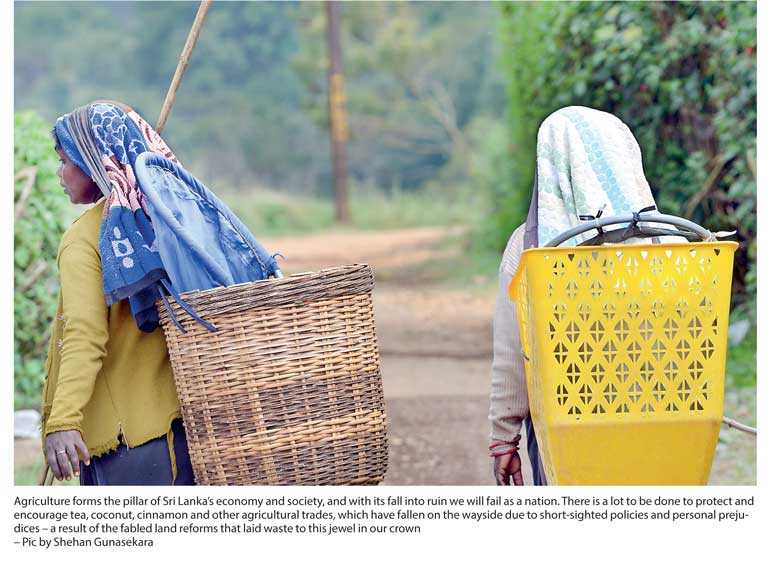Tuesday Feb 17, 2026
Tuesday Feb 17, 2026
Friday, 21 September 2018 00:00 - - {{hitsCtrl.values.hits}}
 By Ajith Perera
By Ajith Perera
As the Government led by the exchequer prepares its policy plan for 2019, once again expectations are for a welfare budget given the impending presidential election and subsequent government polls. Populist measures to persuade a politically inept populace for the purpose of power, with very little hope for change from this wasteful practice.
Nevertheless, amidst the capricious pageantry, there is room to lay groundwork and even enhance existing policy with the aim of sustainable development – alongside the establishment of a stable government. Needless to state, encouraging foreign investments, developing local agriculture, safeguarding local industries, revenue and boosting domestic incomes must receive significant preference.
If the Government is concerned about upsetting apple carts of voters, it can safely choose to focus on safeguarding local industry and revenue which would also permeate greater social benefits. It’s mostly about tying up loose-ends that impede existing policy.
For instance, record high cigarette prices make Sri Lanka a hotbed for smuggled illicit cigarettes and the social and economic fallout of this menace is manifold. Increasing cigarette prices to discourage smoking was a laudable move, but this in turn has prompted smugglers to target Sri Lanka for greater profits which is reflected in the growing number of detections by authorities. Burgeoning Chinese investments and its workforce have compounded the problem with many recorded incidents of smuggling of Chinese brands. This is plainly evident on the streets of Colombo next to many construction sites led by Chinese.
A mere 100 smuggled cartons present Rs. 1 million in profits to racketeers, at the expense of further millions in healthcare and costs to consumers and Government. Sri Lanka’s cigarettes cost Rs. 55 a stick, and much of this consists of tax. Thus, for racketeers infiltrating the market, this translates to significant profits off a single carton. Government and industry estimates point to over 500 million sticks already infiltrating the Sri Lankan market, which would amount to a loss of Rs. 27 billion to the State. Furthermore, as illicit products are not governed by any regulations or standards, their consumption poses a greater health risk to consumers, plus, illicit gains to smugglers.
The Government needs to close these loopholes in terms of policy and actions. Stricter penalties must be imposed on those caught smuggling illicit cigarettes into the country. Current regulations don’t amount to much more than a slap on the wrist. Smuggling tobacco products must be perceived as serious an offence as smuggling drugs. The Government needs to educate and invest on greater border controls, and this would be an effective exercise that goes beyond the tobacco trade.
There is a large vacuum in terms of employing technology to tackle smuggling and providing adequate disincentive to bribe or smuggle. Penalties must become harsher. The Government earns well over Rs. 130 billion from the domestic tobacco industry, and enhancing these measures would serve to safeguard these earnings and the local economy that evolves with it. Controlling illicit in the tobacco trade could result in over Rs. 35 billion in earnings and savings to Government in real terms.
The mooted plan to issue new licenses to import cigarettes to contain the illicit trade will do little to control the problem. In contrast, this could result in much greater losses to revenue and public health, as policing imports and the quality of products would pose a serious number of challenges. What is effective would be to further strengthen the existing framework. The Middle East serves as a hub for illegal tobacco smuggling, and a great deal of data exists with respect to its trails. Greater cooperation between authorities in both regions can serve to quell its growth.
The other area the Government must turn strictly turn its attention to is agriculture. We must safeguard our unique value propositions like Ceylon Tea. We cannot allow blending to erase the great value and network we have built with this brand and the country, for the sake of benefit and profit for a few. Steps must be done to encourage new investments in plantations and bring back the glory of yesteryear, as industries such as tea are pivotal to uphold the Sri Lankan brand of quality, value and heritage in global eyes.
Ceylon tea is Sri Lanka’s greatest ambassador, and sectors like garments and technology do not communicate the Sri Lankan story despite their prowess as done by our agri produce. Agriculture forms the pillar of Sri Lanka’s economy and society, and with its fall into ruin we will fail as a nation. There is a lot to be done to protect and encourage tea, coconut, cinnamon and other agricultural trades, which have fallen on the wayside due to short-sighted policies and personal prejudices – a result of the fabled land reforms that laid waste to this jewel in our crown.
Development policy for Sri Lanka must focus on enhancing local and foreign investments and strengthen our local trade, as a growing welfare bubble presents numerous challenges and risks. Whilst we cannot anticipate either political party to divest from this wasteful practice at this juncture, it must be noted that investors have spent yet another five years on ‘wait-and-see’. How much longer must they wait, and how much longer before they lose faith in Sri Lanka?
(The writer is a retired Administration, Shipping and Maritime Security Consultant in Sri Lanka and the Middle East.)